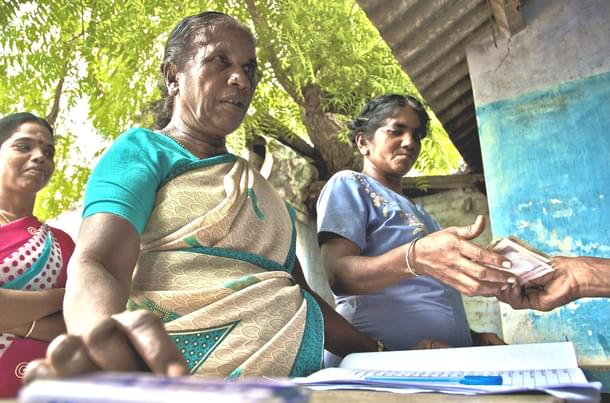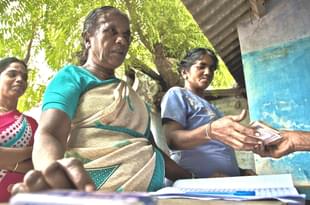Politics
Modi Government Should Not Leave Out Indian Origin Tamils From Sri Lanka When It Brings The Citizenship Bill Next
S. Kaushik
Oct 20, 2019, 06:04 PM | Updated 06:18 PM IST
Save & read from anywhere!
Bookmark stories for easy access on any device or the Swarajya app.


According to the Annual Policy Note 2019-20 tabled by the Government of Tamil Nadu, there are currently 18,871 families consisting of 60,438 persons staying in 107 refugee camps in Tamil Nadu.
The number of refugees staying outside the camps (non-camp refugees) and registered with police is 34,684 belonging to 13,684 families. Another special camp in Tiruchirapalli district houses 31 persons who have been detained under the Foreigner’s Act, 1946.
It has been nearly four decades since the persecuted Tamils started landing on the shores of Rameswaram from Sri Lanka and close to a decade since the war ended.
Both the state and the Centre responded to these refugees with sympathy and provided assistance for them to lead normal lives in India. Yet, their futures remain in limbo.
Various political parties have used the issue of Tamil refugees for their own political gain. It also becomes a point to stoke separatist sentiments among the larger Tamil society in India. Hence, this long pending issue requires immediate attention.
Who Are The Indian Origin Tamils?
The Indian origin Tamils, or the Malayaha (hill-country) Tamils, are a group from the Sri Lankan Tamils. They are popularly referred to as the ‘umbilical cord brethren’ of the Tamils living in India.
They are the descendants of Tamil labourers who were brought to Sri Lanka by the British, to work in plantations, railways and other projects.
The world-renowned Sri Lankan tea that forms the backbone of the island nation’s economy has the blood and sweat of Indian origin Tamils.
During the ethnic conflict, these Tamils were the most vulnerable to conflict as their geographic location placed them right at the centre of the island surrounded by Sinhalese population.
Despite being the most persecuted, they did not subscribe to the idea of Tamil Eelam. Outfits like Eelam People’s Revolutionary Liberation Front made attempts to recruit them, but their attempts went futile.
Indian origin Tamils realised that even if a separate Tamil nation became a reality, they would be at a disadvantage considering their geographical placement. So, they stayed away from the militant struggle.
As a result, they had to face the brunt of both the Sinhalese and the Tamil Tigers onslaughts. The 1977 and 1983 riots saw many Indian origin Tamils getting killed.
They realised that they cannot live in Sri Lanka and chose to come to Tamil Nadu in the hope of getting Indian citizenship.
Indian Citizenship Laws
Though the policy note tabled by the state government does not distinguish between Sri Lankan Tamil and Indian origin Tamils, Prof. V. Suryanarayan in his book Refugee Dilemma places the number of Indian origin Tamil refugees living in camps at 29,500.
Most of them belong to the Dalit and Backward communities. They had left all their belongings, sold all their properties and share no links with Sri Lanka.
Many of their children have been born and have got educated here in India. However, they are not given Indian citizenship due to a variety of factors.
The statute governing citizenship by registration and naturalisation in India is Section 5 and Section 6 of the Citizenship Act, 1955 respectively.
The refugees who came to India during the civil war, fall under the ambit of ‘illegal immigrants’ as they did not come with proper documents.
This makes them ineligible to avail Indian citizenship under both sections even though they fulfil the necessary criteria.
Another factor that stands as a hurdle is a circular issued by the Centre in 2007 that made refugees from Sri Lanka ineligible to acquire Indian citizenship.
In the circular addressed to the Special Commissioner for Rehabilitation, the Secretary to the Government of Tamil Nadu mentioned that the Government of India has given strict instructions to not accept applications from Sri Lankan refugees. This circular should be immediately withdrawn.
It is not that the Indian origin Tamils were never considered for Indian citizenship. The Sirimavo-Shastri Pact of 1964 and the subsequent Sirimavo-Gandhi Pact of 1974 paved the way for grant of Indian citizenship to 6,00,000 plus their natural increase and Sri Lankan citizenship to 4,00,000 plus their natural increase to the Indian Tamils living in Sri Lanka.
These two agreements were signed without considering the views of the people concerned. Majority of the Indian origin Tamils of that time wanted to take roots in Sri Lanka by acquiring Sri Lankan citizenship.
The process of repatriation that started in 1968 never saw its completion. In October 1981, India decided to stop receiving applications for citizenship.
By February 1986, the number of Indian Tamils repatriated stood at 4,59,410 out of which 3,33,482 were covered under the two agreements and 1,25,567 were the natural increase.
When the civil war started in July 1983, the Indian origin Tamils who were to be repatriated to India came as refugees.
The Mandapam camp which was used for receiving repatriates became a refugee camp. Some of them who were conferred Indian citizenship but could not come to India wanted to acquire Sri Lankan citizenship.
The Grant of Citizenship to Stateless Persons Act (No. 39) gave Sri Lankan citizenship to 2,33,000 persons and their natural increase.
The Grant of Citizenship to Persons of Indian Origin Act (No 35) of 2003 gave Sri Lankan citizenship to the residual persons of the Sirimavo – Shastri Pact.
But those who were covered under the pacts and came to India as refugees remain stateless.
Today, all they have is a refugee card for identifying themselves in India. It does not enable them to lead normal lives.
Though Tamil Nadu provides free education till standard 12 and further supports them financially to pursue higher education, it becomes next-to-impossible for them to find a meaningful job in India.
Refugees are not eligible for government employment. The private sector also hesitates to employ a person if they come to know that they are from refugee camps. They either remain unemployed or find themselves at the mercy of private contractors doing jobs that are underpaid.
A few media reports also point out that among those who get repatriated to Sri Lanka, a few of them are coming back to India as they do not have the means and opportunities to survive there.
The Solution
On 17 June 2019, Justice G.R. Swaminathan of the Madurai Bench of Madras High Court delivered a landmark judgement ordering the Centre to consider the applications for conferring Indian citizenship to Indian origin Tamil refugees.
The writ petition was filed by 65 Indian origin Tamil refugees residing in Kottapattu camp in Tiruchi district.
This judgement has given hopes to 29,500 Indian origin Tamil refugees staying in Tamil Nadu. In light of this judgement, the Centre should take steps to end the tribulations of these people.
Article 11 of the Constitution provides Parliament the power to regulate citizenship laws.
The NDA government in its previous term brought the Citizenship Amendment Bill 2016 which sought to exclude migrants belonging to Buddhist, Christian, Hindu, Jain, Parsi and Sikh communities from Afghanistan, Bangladesh and Pakistan from the ambit of illegal immigrants.
The bill also allows persons belonging to these communities to acquire Indian citizenship through naturalization.
However, the government made a glaring error by not including Indian origin Tamil refugees who fled Sri Lanka due to ethnic cleansing that started in 1977.
It is sad to know that none of the political parties from Tamil Nadu put enough effort to highlight this.
The entire debate surrounding the bill got skewed towards immigrants coming from Bangladesh.
If and when the government introduces a new Citizenship Amendment Bill, it should include Sri Lanka as one of the countries and enable Indian origin Tamil refugees to get citizenship.
These people are not welcome in Sri Lanka. Most of them have severed ties with the country and do not wish to go back. A generation of these people have been born and raised in India.
This is the only land and society that they are familiar with. Yet their voices have been unheard by most of the political parties in Tamil Nadu including those who claim to be champions of Tamil rights.
Their long pending plea for citizenship needs to be fulfilled at the earliest.
The author is a post graduate student of TISS Mumbai and the Deputy Director of Tamilagam Research Foundation





